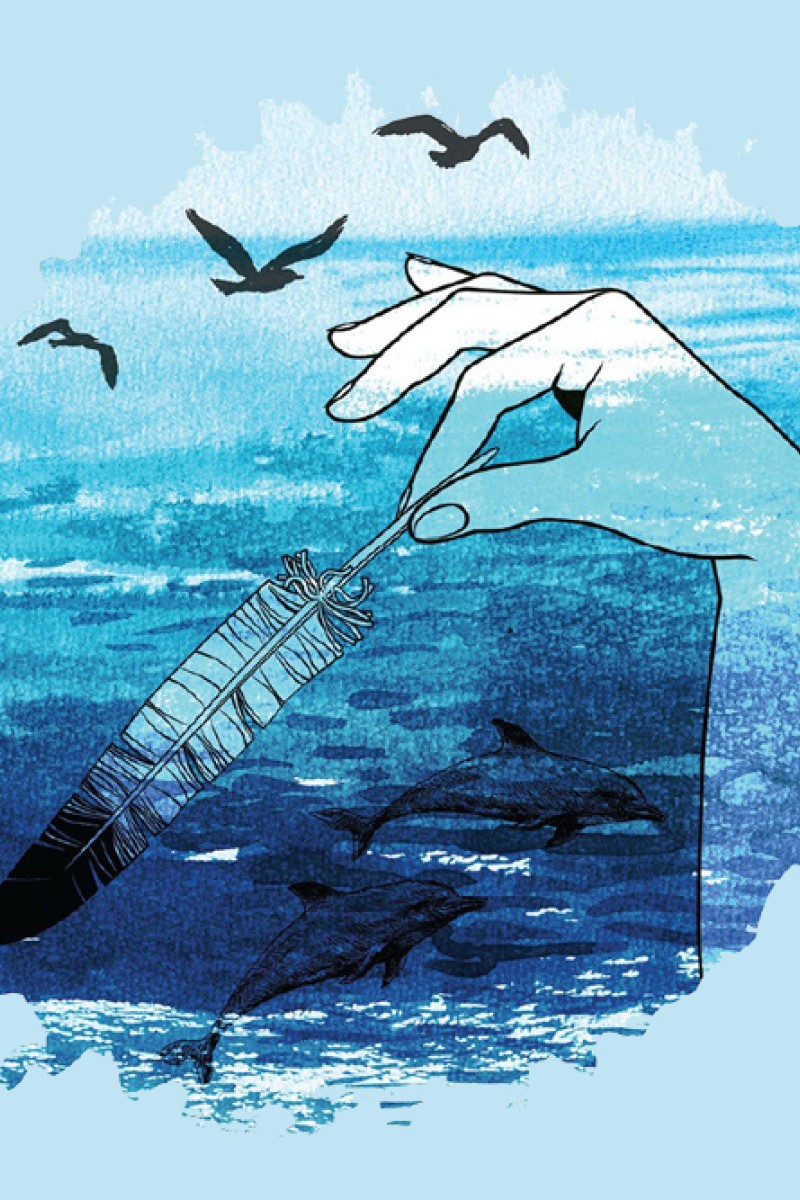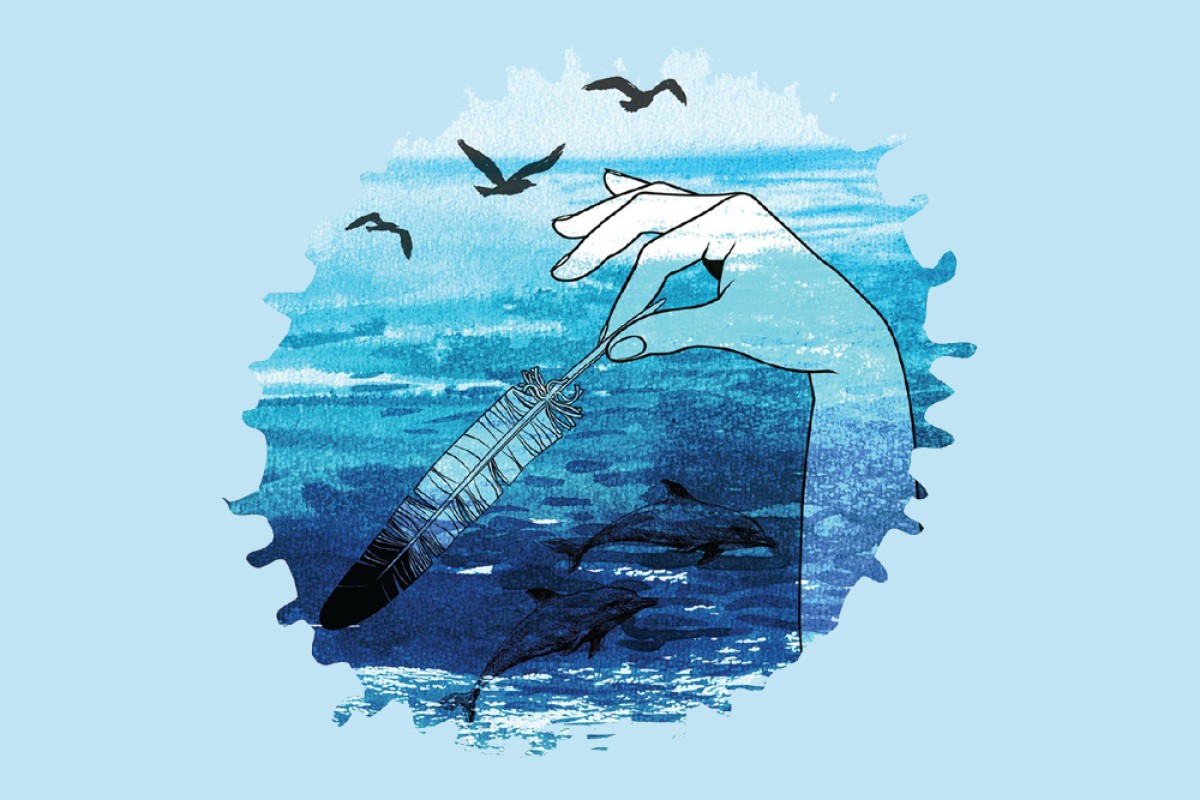
Finding my way back to the ocean
As a lonely young writer struggles to deal with anxiety, the ocean becomes the one place where they find solace and inspiration

This story was written by Monica Wat, a 16 year old student from Holy Family Canossian College.
This story is one of the finalists of Young Post’s 2017 Summer Short Story Competition. Each week during the holidays, we will publish one of the finalists’ stories. The winning entry will appear in Young Post on August 26.
Every time I received my report cards vividly coloured in red, I wondered whether the teachers had wanted to write “bad at everything” in bold instead of “room for improvement in most areas”.
I’ll never forget the time my Primary One English teacher addressed me as “the underdog”. Her beady eyes inspected my tangled hair and faded uniform with a disdain that sent a jab through me like a syringe. Thanks to her, “underdog” was probably the first complex piece of English vocabulary I learned.
If my teacher’s glare was a syringe, then the glares of my classmates were the lens of a microscope. Scrutinising. They had all pinned their labels on me. Stupid. Crazy. But a microscope only magnifies the surface. They couldn’t see what lay beneath.
My family’s little home was right by the beach, and this was where I spent all my free time. I walked back and forth along its curved shoreline , gazing wistfully out at the ocean, alone with my thoughts. I liked how the beach was where the sea and land met each other; it seemed conciliatory to me. I felt like the sea had come to meet me, to take me away somewhere new.
Numbers and words were alien to me
As a child, when I should have felt carefree and easy, I didn’t. In a room filled with the bright laughter of my classmates, I was always my own dark cloud. I remember, sobbing and fidgeting, being handed a toy car. I didn’t know what I was supposed to do with it. I remained as still as a stone, afraid I would break it.
When I got a little older, I was diagnosed as having anxiety by the school’s councillor. Could a child suffer from anxiety? It sounded like an oxymoron. I asked my parents if it was true; they replied dismissively that I was just a “meek, timid child”.
At school, I wasn’t a gifted student. In fact, I wasn’t even close; my grades were appalling. My mum bought me text book after text book, making me do exercise after exercise. I obediently ploughed my way through each one like a soldier through a trench, glancing only now and then at the view of the beach through the window.
But as time went on, numbers and words grew increasingly alien to me, and I began struggling more and more with the advanced maths and English exercises assigned by my mother. When I stared at the text on the paper, it started to blur and dance around the page, like heat coming off tarmac. The same thing happened at school when I tried to focus on the writing on the blackboard. It just wouldn’t stay still. And then my anxiety would creep in, like a ghost tapping on my shoulder.
I tried to tell my parents how I felt, but they thought I was making excuses. They agreed with my English teacher. I was an underdog.
Escaping to the ocean
Whenever things seemed at their worst, when I felt trapped, claustrophobic, and close to suffocating, I always escaped to the beach. There, the sea was so vast and the sky so expansive that the words in my texts books and on the school blackboard, and the words of my teacher, mother and classmates, dissipated. Looking back at it now, I feel as if I became the sandpiper in Elizabeth Bishop’s poem: for a moment, the world could be vast and clear, while the next, minute and misty.
I did not know this was the beginning of a vicious cycle. My emotions were two polarised continents. Some days, when I snuck out of school and ran off to the beach, I felt giddy with excitement at having eluded my teachers. Then, the first pang of guilt would attack, and I’d hear the reprimands from my parents and the school for my irresponsibility and recklessness: Why are you not going to school again? Why do you always make me worry? You see the kid of our neighbour? Why can’t you be as good as him?
When this happened, I would gaze out at the calm, still water and remind myself that the sea was not always like this. It was volatile. It tossed violent waves high up into the sky just as frequently as it sent them gently rolling to the shore. It seemed like I was condemned to the same fate, always going from one extreme to the other. And yet, its changing moods were what made the sea, the sea. And my changing moods were what made me, me.
Finding solace in books
One rare day in Secondary Three when I actually went to school, I was hunched over at my desk, jotting down some similes on a scrap of paper tucked under a weighty text book. My class teacher discovered them. To my surprise, she did not scold me like I expected her to. Instead, she read the poem in silence, her expression giving nothing away, while I waited anxiously. Finally, she looked up from the paper.
“I think you have potential here” she said.
She recommended that I take an elective in literature. I was sceptical; my English was still really bad. But as my grades in science and economics were even worse, I followed her advice. Naturally, my parents were disappointed, but it was the sort of disappointment both they and I had grown accustomed to. Besides, literature offered a promise of escape — escape into books — and I badly wanted top put my faith in that promise.
But as it turned out, books didn’t just offer escapism. They gave me clarity. We studied a book called The Yellow Wallpaper, and it was impossible not see parts of myself in the character.
My teacher noticed too. She suggested I see an old classmate of hers who was now a therapist. The therapist, in turn, referred me to another specialist, and eventually I was diagnosed with bipolar disorder.
I felt a wave of relief. Finally, there was an explanation. A name for the way I felt.
For my parents, it was the confirmation they had never wanted. They denied me treatment, saying I watched too many movies.
But it didn’t matter. I now knew the names of my old friends, and it was the fuel I needed to drive them away. I continued to visit the therapist twice a month, free of charge, without my parents’ knowledge.
My schoolmates knew, because I decided to tell them. I had learnt that mental illness wasn’t something I should have to conceal. There were mixed reactions; some people were clearly uncomfortable around me, but I decided that was their problem, not mine.
Keep on writing
There was no sudden, dramatic transformation in my school grades. Maths was still maths; it never was and never will be my strength.
But in literature, I began to see a slow, snail-like trail of progress. Books became not only my greatest solace, but my greatest weapons. Holden Caulfield and Jane Eyre became my new best friends. My favourite book of all, though, was T he Old Man and the Sea; I have always felt so connected to the ocean that everything to me has a tint of blue.
As the DSE exams approached, I buried my head in past papers and revision books. For once, I didn’t have to be coerced into studying. It was with a pounding in my chest and lump in my throat that I received my results: a Grade 5* in English Literature, but a Grade 3 in every other subject. I didn’t get accepted into any university in Hong Kong.
But my story didn’t end there. A few months before the examinations, my literature teacher had suggested that I enter a local poetry competition. The same day that I received my DSE results, she informed me that I had won it. It might have seemed like a small victory compared with my bigger failure, but it meant more to me than anything else. What’s more, it was all the encouragement I needed to keep on writing.
A tint of blue
Three years later, I am writing this story next to a bright open window overlooking the British shores of the Atlantic ocean. On days when my anxiety and depression overwhelm me again, I go and sit by the water and let the gentle lapping of the waves sing me their lullabies. When I’m feeling happy and carefree, I feel as if the waves are applauding me, soaring high and filling the air with salty spray.
I don’t know what the future has in store for me. All I know is, no matter what path I take through life, I will always be able to find my way back to the ocean.